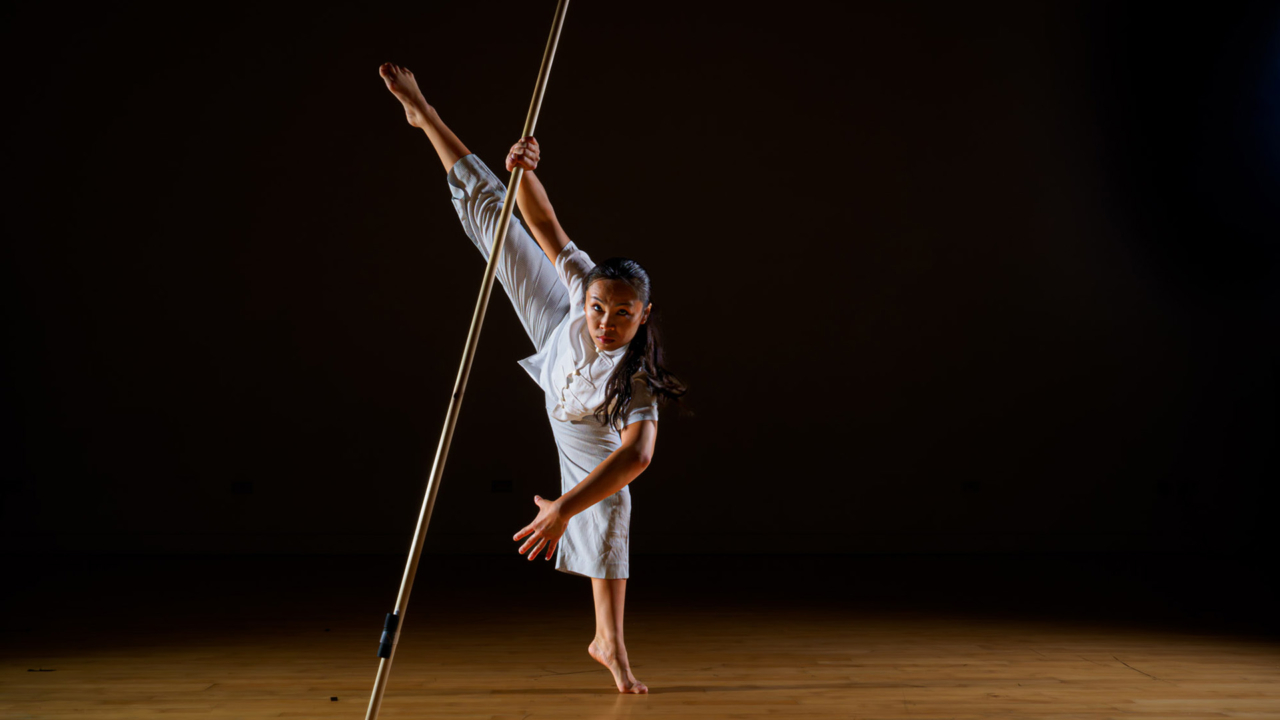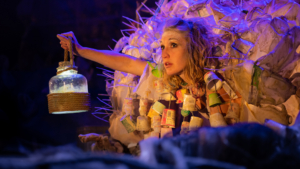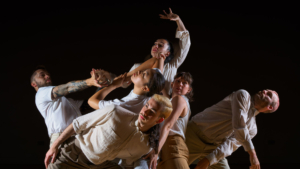- Posted on May 28th, 2025
Deep Touring Model for Dance

Can we reframe environmental responsibility and justice as drivers for creative choices rather than limitations?
With funding support from Arts Council England and Danish Arts Foundation as part of the International Touring Environmental Responsibility (ITER) programme, Pavilion Dance South West, Aarhus Festival, Askonas Holt and Bora Bora collaborated on a trial of small-scale dance touring that places environmental responsibility at the heart of international working.
What is Deep Touring?
Deep Touring is an approach that Pavilion Dance South West adopted since 2023 as an antidote to the traditional fly-in-fly-out model for dance touring. We advocate for ways of sharing dance that focus on creating rich and impactful artistic experiences beyond the fleeting moments on stage. We want dance artists to have more opportunities to connect and have meaningful exchanges with local communities when touring their work. From delivering workshops during their visits to co-creating with communities, Deep Touring invites artists to consider how they would like to share their work and their artistic practice with people.
Applying such an approach in our local context in the South West of England has certainly shifted the ways in which we bring art to communities. We were interested in exploring how the Deep Touring ethos could be adopted when working internationally. Moreover, we were keen on going on a journey of restarting international working in ways that embrace environmental responsibility as fully as we could from the beginning.
The Tale of Two Dances – from UK to Denmark
As part of our ITER project, we were dedicated to embedding environmental responsibility in three different areas. We wanted to:
- minimise carbon emissions in the ways that we travelled
- create deep and impactful connections with local communities rather than only focusing on the presentation of performances
- place environmental awareness at the heart of creative processes and decision-making so that it is not an afterthought in the project
Two environmental-themed dance productions from the UK were selected to be presented at Aarhus Festival in August/September 2024.
Fault Lines by Lila Dance (Associate Artist of Pavilion Dance) is a work set in the near future where the devastating impact of climate change has changed society. Six survivors navigate a landscape created from digital imagery and an evocative score. Though environmental damage has been inflicted, Fault Lines looks at how we can change our future if we stand together with hope.
Plastic Paradiso by Claire Benson is a Pavilion Dance commissioned work for children and their families that is based on Helen Ward’s storybook ‘The Tin Forest’. Through puppetry and dance, Claire reimagines a place entirely made of plastic, and how friendship and nature can reclaim what was a barren world. It raises awareness of single use plastic and, in particular, its effect on our oceans.

Adapting Slow Travel
The carbon footprint of air travel is often the single item that contributes to the highest amount of carbon emission for dance touring, which we were keen to minimise for this project. We adopted different modes of transportation for the two productions in order to compare their respective environmental impact; one group travelled by train and the other group travelled by electric vehicle.
Lila Dance travelled from Edinburgh via London to Aarhus by train with a group of six on the tour. The trip to Aarhus consisted of 5 train journeys across 2 days with an overnight stay in Germany. Not only was it a long journey, it was also far more challenging than anticipated; having to navigate train delays, compulsory seat reservations, varying rules in different countries, lack of meals and refreshments on some trains, and running between platforms with heavy luggage, the trip was far from the slow and relaxing journey that one would have imagine for train travel. When the group ultimately arrived at Aarhus after being on the road for 48 hours, it was overwhelmingly a sense of relief rather than the usual excitement for touring. Having to jump straight into rehearsal the following day after such an arduous journey was certainly less than ideal.
For Plastic Paradiso, the team of two drove an electric vehicle from Bournemouth to Aarhus. This journey was also not without its challenges. Long driving hours, unpredictable experiences of charging points along the way, and confusing rules about carnet through the channel tunnel from UK to mainland Europe meant that the team spent three long days on the road (they had two overnight stays in Holland and Germany). Even though stops were made along the way, there were hardly any breaks as the team had to plan for the next stop to ensure they could charge the car and make sufficient progress on the journey.
A flight from London to Aarhus (direct) takes 1 hour and 35 minutes. A flight from Edinburgh takes 8 hours with changes at Amsterdam and Copenhagen. At the time, the cost of a return ticket from London was £300 per person – significantly cheaper than paying for artist time, per diems, overnight accommodation, tickets, car hire and charging. Nevertheless, we were glad to know that the carbon emission of the travel for this project was significantly lower than if we had chosen air travel. Lila Dance saved over 2.7 tonnes of carbon, even after factoring in staying in hotel accommodation overnight. Claire Benson cut her emissions by two thirds by using an electric vehicle as opposed to a diesel fuel van (56.6 kg Co2e for EV versus 196 kg of C02e from fossil fuels).

Creating Deep Connections
Having adopted slow travel options which were more environmentally friendly, we wanted to ensure that we make best use of the trip by creating as deep of an impact as we could through our tour. With Deep Touring ethos in mind, we were keen on looking at how we could create deep and impactful connections with different communities in Denmark through this project.
For Fault Lines, Lila Dance worked with three Danish dance artists and integrated them into the cast for the performances in Aarhus. Lila Dance worked with dance house Bora Bora and Aarhus Festival on an open call to recruit dance artists in Denmark. Dancers were selected based on video submissions and rehearsals took place online for 20 hours the month before arrival. When Lila Dance arrived in Aarhus, the UK and Danish cast finally met in person for the first time and went into an intensive rehearsals period together for 4.5 days. It was no easy feat for the Company to merge the cast in such a short time, yet Lila Dance excelled in creating a transnational ensemble that integrated seamlessly as one.
For Plastic Paradiso, Claire Benson spent the week prior to the performances delivering a series of puppetry and movement workshops for school children in Aarhus. Claire has had plenty of experience delivering workshops to children in the UK, yet delivering workshops to children from a different cultural background was undoubtedly one of the highlights of the journey in terms of cultural exchange. We were able to reach 129 children through the workshops, some of whom also had a chance to attend the Plastic Paradiso performances at Teater Refleksion.
Making Green Creative Choices
From the beginning of this project, the partners and artists were clear that we were not interested in making green choices at the expense of the artistic integrity of the works. We understood that different choices might be made when environmental responsibility is considered as part of the process. However, we were adamant that these choices need not diminish the artistic value of the works.
For Lila Dance, working with Danish dance artists was not only an invaluable opportunity for intercultural exchange and collaboration, but it also reduced the number of people travelling on tour from nine to six. This in turn reduced the carbon emission of the project and minimised environmental impact. The online rehearsals also minimised travels for individual rehearsals prior to the cast coming together for the production week in Denmark. In addition, Lila Dance was aware that they were going to take the production on tour and made the decision to use video projection as scenography rather than a physical set when creating the piece. This minimised the amount of cargo they needed to take on the road.
Plastic Paradiso, on the other hand, was a show that was created before the ITER project and already had an elaborate set created from found objects gathered from beaches in the UK. Instead of taking the entire set on the road, we worked with Danish artists to recreate the set using found materials in Denmark. That, in itself, became another artistic collaboration between UK and Danish artists, with original Designer Holly Miller advising on the build of key set pieces through online consultation. With set components being sourced locally, we created ‘the Danish version’ rather than simply replicating the set as it was when the piece was presented in the UK.

Learning for the future
One of the main takeaways from this project is that touring in an environmentally responsible way costs far more time and money than we are used to. Almost every choice we made in this project had consequences around finance and team capacity which we underestimated at the start of the project. However, if we were to look at it from another perspective, we ought to consider the real cost of international touring being what was spent on this project. The time and costs saved in more traditional touring models are in fact at the expense of the environment. The truth is we as a sector might not be ready to admit that the status quo is exploitative of the environment as we are so accustomed to the efficiency and convenience of our current ways of working. Hopefully, with evidence from projects like this, we might start to draw people’s attention to the resources needed and call our respective Governments to action to help us develop more sustainable ways of touring for the future.
With thanks to our funders, partners, venues and – not least – all the artists and technicians who made this exploration possible.
Applications are currently open for round 4 of the ITER programme.
Header image: Fault Lines – Lila Dance – credit – Dougie Evans
Resource Materials
Find out more about the ITER programme